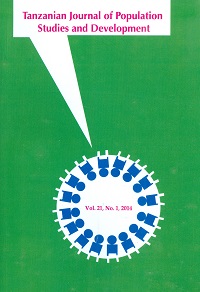The Role of Participatory Geographic Information Systems in Conflict Resolution: A Case Study of Ngezi Forest in Pemba, Zanzibar
Abstract
This article discusses the problem of forest change and how it can lead to resource use conflicts. Specifically, it examines change in Ngezi Forest, in Pemba, Tanzania, and assesses how forest fragmentation in the area can cause resource use conflicts. It also investigates the nature and extent of the conflicts, and proposes conflict resolution strategies for better management of the forest. Data was collected from ten villages surrounding the forest. The target groups comprised of local communities, NGOs, as well as local and central government officials in and around the forest. Data was collected through focus group discussions, participatory mapping, and field observation. Data obtained through participatory mapping was exported to the Geographical Information Systems software for further analysis. The results revealed that there is a considerable decline of the forest area and other vegetation types in the forest. The forest cover declined by 116.1ha (2. 3%) between 1952 and 1989, and between 1989 and 2015 it declined by 47.3ha (0.94%), with an annual rate of decline of 3.1ha/year. The decline in forest cover triggered conflicts between the government and the local communities who harvest forest products for their livelihoods. The high demands of forest products were exacerbated by limited agricultural land, increasing economic hardships, lack of alternative sources of living, rapid population growth, poor management, and illegal exploitation of forest products. Therefore, the study recommends that peoples ' livelihoods and conservation initiatives outside the reserve be considered when searching for a sustainable forest resource management plan.
Keywords: forest change, resource use, conflict, PGIS, conflict management


